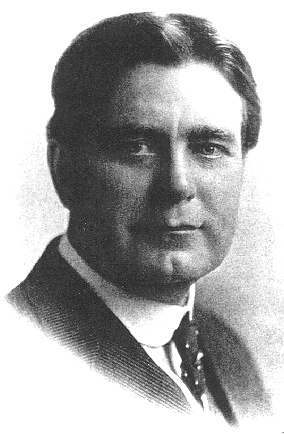William E. Borah, the chief prosecutor in the Haywood trial, was born at the close of the Civil War, the son of a stern, puritanical Illinois farmer. In college at the University of Kansas, Borah befriended William Allen White, later to become the famed editor of the Emporia Gazette, who described his college buddy as a "hardworking, substantial, serious student who smiled easily but rarely laughed." After two years at KU, Borah contracted tuberculosis and dropped out of college to read law. After impregnating a Lyons, Kansas woman and being asked to leave town, Borah boarded a westheading train where he met a gambler who told him that Idaho, then only three months a state, was an ideal place for young, ambitious men. Borah took the gambler's advice and opened a law office conveiently located on the edge of Boise's red light district, where Borah frequented the best homes, earning a reputation as "the town bull." Borah's practice grew as he became a favorite of timber barons, ranchers, mine operators, and other men of commerce. Eventually Borah was to have the biggest and most profitable legal practice in the state. Borah's interest in women continued unabated throughout his career, and at one time a long affair between him and Theodore Roosevelt's married daughter, Alice Roosevelt Longworth, earned her the nickname "Aurora Borah Alice."
Borah had a strong interest in politics, beginning with a race for city attorney of Boise which he lost by three votes in 1891. By 1896, Borah was the leader of Idaho's Silver Republicans, bolting the national ticket to support Frank Steunenberg's campaign for governor. Borah maintained his political independence, often opposing the Republican Old Guard. Eventually, he found himself drawn into the Progressive camp of the party. In 1906, as Bill Haywood bided time in a Boise jail, Borah was at the peak of his political powers, and seen as a virtual shoe-in for the Republican nomination to the the U. S. Senate. Later that year an investigation of timber fraud was to threaten to bring down his promising poitical career. (Borah was tried on timber fraud charges in late 1907, defended by Jim Hawley, and acquitted by a jury after 14 minutes of deliberation. Clarence Darrow took an interest in Borah's case, publicly pronouncing him "guiltless of complicity" in the fraud.)
In the courtroom, Borah had a reputation for both shrewd strategizing and forceful oratory. He was generally seen as the lead prosecuting attorney in the Haywood trial, handling the cross-examination of Haywood and providing the final prosecution summation. Borah's closing argument was described as "one of the finest summations of his life." Borah himself was drained both by the trial and the ongoing federal investigation of his timber dealings. He called the Haywood trial "one of those battles that make a man grow old." Borah was the only attorney not present when the jury announced its verdict. Later he was seen standing in a doorway leading to his law office looking, according to Ruby Darrow who saw him, "alone, abandoned-- the most downcast man I ever saw."
After the Haywood trial, William Borah served in the United States Senate, becoming a notable champion of Progressive causes.

